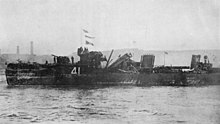HMS Spitfire (1912): Difference between revisions
No edit summary |
{{Acasta class destroyer}} added and dates unlinked |
||
| Line 96: | Line 96: | ||
'''HMS ''Spitfire''''' was an [[Acasta class destroyer|''Acasta''-class]] [[destroyer]] of the [[Royal Navy]] which took part in the [[battle of Jutland]] in [[1916]]. |
'''HMS ''Spitfire''''' was an [[Acasta class destroyer|''Acasta''-class]] [[destroyer]] of the [[Royal Navy]] which took part in the [[battle of Jutland]] in [[1916]]. |
||
She was launched on |
She was launched on 23 December 1912 and joined the Fourth Destroyer Flotilla, attached to the [[Grand Fleet]]. |
||
Amongst the small engagements which happened during the night of |
Amongst the small engagements which happened during the night of 31 May–1 June 1916 during the Battle of Jutland was one between ''Spitfire'' and the [[Germany|German]] [[battleship]] [[SMS Nassau|''Nassau'']]. ''Spitfire'' evaded an attempt by ''Nassau'' to ram her, but the two ships nevertheless collided and ''Spitfire'' was seriously damaged, blast from ''Nassau's'' guns demolishing much of her upperworks, but she ripped off a 20 ft (6 m) section of the German ship's side plating. Both ships survived to return to port.<ref>''The Grand Fleet; Warship Design and Development 1906-1922'', D K Brown, 1999, Chatham Publishing, ISBN 1-86176-099-X </ref> |
||
''Spitfire'' also helped in the rescue of survivors from the hospital/evacuation ship ''Rhodesia'' (formerly the [[Union Castle Line|Union Castle]] liner ''Galway Castle'') which was torpedoed 160 miles off Fastnet by the [[submarine]] [[Unterseeboot U82|U-82]] on |
''Spitfire'' also helped in the rescue of survivors from the hospital/evacuation ship ''Rhodesia'' (formerly the [[Union Castle Line|Union Castle]] liner ''Galway Castle'') which was torpedoed 160 miles off Fastnet by the [[submarine]] [[Unterseeboot U82|U-82]] on 12 September 1918. |
||
''Spitfire'' was sold for scrapping in May |
''Spitfire'' was sold for scrapping in May 1921. |
||
[[Image:HMSSpitfireJutlanddamage.jpg|thumb|right|''Spitfire'' after suffering damage in the Battle of Jutland]] |
[[Image:HMSSpitfireJutlanddamage.jpg|thumb|right|''Spitfire'' after suffering damage in the Battle of Jutland]] |
||
==References== |
==References== |
||
<references/> |
<references/> |
||
{{Acasta class destroyer}} |
|||
{{DEFAULTSORT:Spitfire}} |
{{DEFAULTSORT:Spitfire}} |
||
Revision as of 20:42, 26 January 2009
| History | |
|---|---|
| Launched | 23 December 1912 |
| Fate | sold for scrapping in May 1921 |
| General characteristics | |
HMS Spitfire was an Acasta-class destroyer of the Royal Navy which took part in the battle of Jutland in 1916.
She was launched on 23 December 1912 and joined the Fourth Destroyer Flotilla, attached to the Grand Fleet.
Amongst the small engagements which happened during the night of 31 May–1 June 1916 during the Battle of Jutland was one between Spitfire and the German battleship Nassau. Spitfire evaded an attempt by Nassau to ram her, but the two ships nevertheless collided and Spitfire was seriously damaged, blast from Nassau's guns demolishing much of her upperworks, but she ripped off a 20 ft (6 m) section of the German ship's side plating. Both ships survived to return to port.[1]
Spitfire also helped in the rescue of survivors from the hospital/evacuation ship Rhodesia (formerly the Union Castle liner Galway Castle) which was torpedoed 160 miles off Fastnet by the submarine U-82 on 12 September 1918.
Spitfire was sold for scrapping in May 1921.

References
- ^ The Grand Fleet; Warship Design and Development 1906-1922, D K Brown, 1999, Chatham Publishing, ISBN 1-86176-099-X
